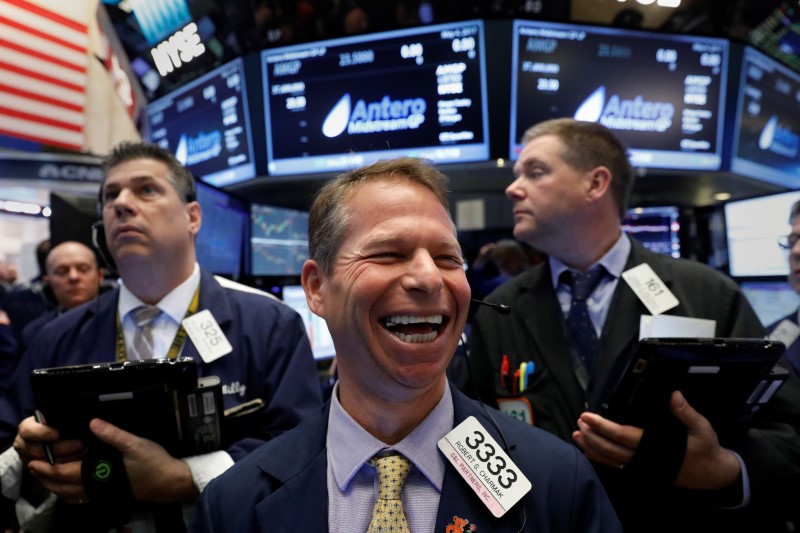By Caroline Valetkevitch and Megan Davies
NEW YORK (Reuters) - U.S. companies are reporting their strongest profit and sales growth in more than five years this earnings season, with more beating expectations and particular strength in the industrial sector.
The results strengthen arguments from some investors that the lofty valuations U.S. equities are commanding are justified, and provide optimism that the eight-year bull run in stocks will keep rolling along. The S&P 500 is trading at about 17.7 times projected earnings, well above its long-term average of 15.
Earnings were expected to be good especially in energy, which has rebounded sharply on higher oil prices from a year ago. Still, results are markedly better than expected.
"The bears will say the comparisons were easy," said Bob Doll, chief equity strategist at Nuveen Asset Management in Princeton, New Jersey. "All of that is accurate, but the truth is a wide swath of companies is beating expectations."
With results in from about 70 percent of the S&P 500 companies, projected earnings growth for the first quarter is now at 14.2 percent while sales are forecast up 7.2 percent, on track to be the best since 2011, Thomson Reuters data showed.
The reports have pushed the estimated projected earnings growth for the quarter from 10.2 percent at the start of April.
Expectations for the full year have risen as well. Analysts typically are still taking down full-year numbers at this time, said Jill Carey Hall, equity and quant strategist at Bank of America-Merrill Lynch. The bank's data shows it is the first time they are rising during first-quarter reports since 2012.
So far, 75 percent have beaten analysts' profit expectations for the quarter, compared to the 71 percent average of recent quarters and the long-term average of 64 percent.
Since the start of April, forecasts for every sector except telecommunications have improved - but energy, financials, technology and materials are expected to have the biggest year-over-year gains.
Earnings for industrials, which on April 1 were projected to have fallen 5.4 percent, are now forecast up 3 percent, the data showed, giving it the biggest improvement so far of any sector aside from energy.
"Everything we're seeing so far from the industrial space is confirming a big bounce in growth as we progress to the back half of '17," said Patrick Palfrey, senior equity strategist at RBC Capital Markets.
Caterpillar Inc (N:CAT) stood out in the space, with its stock jumping sharply after its results, though United Technologies Corp (N:UTX), Cummins (N:CMI) and 3M Co (N:MMM) also beat expectations.
"What we're picking up is the industrial economy is better," said Tobias Levkovich, Citigroup's chief U.S. equity strategist. "Traditional industrial companies are saying things like energy is better, transportation is better, Asia is stronger."
Along with aerospace and defense, results from the construction machinery and heavy trucks space contributed the most to gains in the industrial sector. Many of those companies also rallied after the Nov. 8 election, fueled by optimism over potential increased defense and infrastructure spending under President Donald Trump.
However, Jason Ware, chief investment officer at Albion Financial in Utah, said the divergence of actual results versus those beating investor projections likely meant that "analyst estimates were just far too low for industrials going into the quarter" and did not signify particular economic "strength" in the sector.
Ware pointed to materials, technology, energy and financials as driving the quarter's profit growth.
Tech companies are beating analysts' expectations by 84 percent. Reports from Alphabet (O:GOOGL), Microsoft (O:MSFT) and Amazon.com (O:AMZN) last week impressed analysts and fueled confidence in the sector.
ECONOMIC GROWTH
Still, the earnings are counter to some U.S. economic reports. Data last week showed the economy grew at its weakest pace in three years in the first quarter. At the same time, overseas economies have been improving and the dollar's strength has tempered.
Albion's Ware said that given the "coordinated global economic bounce that we’ve seen" firms with international exposure may see a tailwind in the first quarter and potentially for all of 2017.
Profit growth for S&P 500 companies with overseas revenues of more than 50 percent is at about 21.3 percent, outpacing the overall S&P 500's forecast, Thomson Reuters data showed. Estimates vary on the percentage of S&P sales that come from overseas, but S&P-Dow Jones Indices puts it at less than half.
"The non-U.S. economies seem to be doing better than the U.S. economy. That's been an important part of the story," said

Michael Purves, chief global strategist at Weeden & Co.